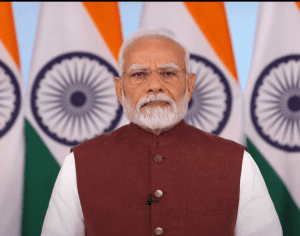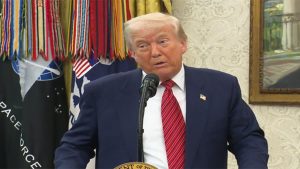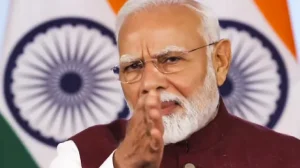New Delhi – In a significant development following recent cross-border hostilities, Prime Minister Narendra Modi has issued a stern PM Modi warning to Pakistan, stating that India has merely “paused” its military operations against the neighboring country. During his first public address since the tensions escalated to missile exchanges between the nuclear-armed nations, Modi emphasized that India would “retaliate on its own terms” to any future provocations from Pakistan.
PM Modi Warning To Pakistan Comes After Brief Ceasefire

The PM Modi warning to Pakistan comes after a weekend ceasefire brought a temporary halt to what many feared could escalate into a full-scale war. The Indian Prime Minister made it clear that despite the pause in hostilities, he was “monitoring every step of Pakistan” – signaling India’s vigilance against any potential threats from across the border.
The ceasefire announcement came on Saturday after several days of escalating military actions between the two South Asian neighbors. Modi’s statements indicate that while operations have ceased temporarily, India remains prepared to resume military action if deemed necessary.
Timeline of Recent India-Pakistan Tensions
The recent clash began when India launched attacks on Pakistan on Wednesday, citing retaliation for a deadly militant attack in April in Indian-administered Kashmir. According to Indian authorities, this April attack was carried out by Pakistan-backed terror groups – an allegation that formed the basis for the PM Modi warning to Pakistan.
What followed was a dangerous escalation, with both sides engaging in drone and missile strikes targeting each other’s key military bases and airfields by Saturday. Additionally, deadly shelling occurred along the disputed border dividing Kashmir, raising international concerns about the potential for wider conflict.
Nuclear Threat Underlies PM Modi Warning To Pakistan
In his address, Modi made a pointed reference to the nuclear dimension of the conflict, stating that India would not tolerate “nuclear blackmailing” in any future confrontation with Pakistan. This aspect of the PM Modi warning to Pakistan highlights the particularly dangerous nature of hostilities between these two nuclear-armed nations.
The nuclear factor has been a persistent concern in India-Pakistan relations, with both countries possessing significant nuclear arsenals. Modi’s comments suggest that India will not be deterred from defending its interests due to Pakistan’s nuclear capabilities – a message that significantly intensifies the PM Modi warning to Pakistan.
US Role in Ceasefire Downplayed
While US President Donald Trump claimed credit for brokering peace between the two nations, Modi’s address notably omitted any reference to American involvement. Trump stated at the White House that the US had “stopped a nuclear conflict” through its interventions, suggesting that “millions of people could have been killed” without American diplomatic efforts.


According to Trump, US Secretary of State Marco Rubio and Vice President JD Vance were instrumental in negotiating peace after hours of intense discussions with both Indian and Pakistani officials. However, the PM Modi warning to Pakistan maintained India’s position that it was Pakistan that initiated contact for a ceasefire through India’s head of military operations, and that Pakistan had sought international community assistance.
Also Read: Trump on India Pakistan Ceasefire: Shocking Truth Behind The US Claimed Ceasefire
Future Talks Will Focus on Terrorism
The PM Modi warning to Pakistan included clear parameters for any future negotiations between the two countries. Modi stated explicitly that “if we talk to Pakistan, it will be about terrorism only,” adding that discussions would also include “Pakistan-occupied Kashmir.”
This stance reinforces India’s long-held position that terrorism emanating from Pakistani soil remains the central issue in bilateral relations. By framing future talks in these terms, the PM Modi warning to Pakistan establishes terrorism as a non-negotiable agenda item for any diplomatic engagement.
Ceasefire Appears to Hold Despite Tensions
Despite the forceful PM Modi warning to Pakistan, the ceasefire appeared to be holding as of Monday. Reports from the Line of Control, the disputed border dividing Kashmir between India and Pakistan, indicated that the cross-border shelling and aggressive activities from the previous week showed no signs of resuming.
In a positive development, India reopened 32 airports across northern India that had been closed as hostilities escalated. This practical step suggests some normalization of operations, even as the PM Modi warning to Pakistan indicates continued vigilance and readiness for potential future conflict.
Military Communications Established
The Indian army released a statement on Sunday night confirming that “the night remained largely peaceful across Jammu and Kashmir, and other areas along the international border.” Additionally, military officials from both India and Pakistan engaged in phone communications and agreed to reduce troop presence at the border.
These developments suggest that despite the strong PM Modi warning to Pakistan, operational channels of communication remain open between the two militaries. Such communication is crucial for maintaining the ceasefire and preventing unintended escalations.
Return to Normalcy in Border Areas
In Indian-administered Kashmir, expert teams were dispatched to border areas to defuse unexploded ordnance. Tens of thousands of civilians who had been evacuated from villages in border areas began returning to their homes, signaling a cautious return to normalcy.
However, the PM Modi warning to Pakistan serves as a reminder that this normalcy remains conditional on Pakistan’s behavior, particularly regarding alleged support for militant groups targeting India.
Analysis of PM Modi Warning To Pakistan
The PM Modi warning to Pakistan represents a calibrated approach that allows India to claim a strategic advantage while leaving the door open for de-escalation. By characterizing the cessation of hostilities as merely a “pause” rather than a conclusion, Modi maintains pressure on Pakistan while providing space for diplomatic engagement.
This framing also serves domestic political purposes, allowing Modi to project strength to the Indian electorate. The PM Modi warning to Pakistan reinforces his image as a decisive leader willing to take strong measures to protect India’s security interests.
International Implications of Recent Tensions
The recent escalation between India and Pakistan drew significant international attention, given the potential consequences of a full-scale war between nuclear-armed neighbors. The PM Modi warning to Pakistan signals to the international community that while immediate hostilities have ceased, underlying tensions remain unresolved.
Pakistan security officials suggested that one term of the ceasefire was an agreement that future talks would be held in a third country, with the United Arab Emirates mentioned as a possible venue. This indicates recognition from both sides that direct bilateral negotiations might benefit from neutral facilitation.
Looking Forward: India-Pakistan Relations


The PM Modi warning to Pakistan establishes clear boundaries for the future relationship between the two countries. By emphasizing terrorism and territorial disputes as central issues, Modi indicates that normalization of relations depends on concrete actions from Pakistan regarding these concerns.
Whether this approach will lead to sustainable peace remains uncertain. However, the PM Modi warning to Pakistan unequivocally communicates India’s position that it will not compromise on what it perceives as its core security interests.
Final Word
The recent military exchanges between India and Pakistan represented one of the most serious escalations in decades between these nuclear-armed neighbors. While the immediate crisis appears to have abated, the PM Modi warning to Pakistan serves as a reminder that underlying tensions remain.
As both nations navigate the path forward, the international community continues to watch closely, hoping that diplomacy will prevail over military confrontation. The PM Modi warning to Pakistan suggests that while India is open to diplomatic engagement, it approaches such discussions from a position of vigilance and readiness to defend its interests through military means if necessary.

